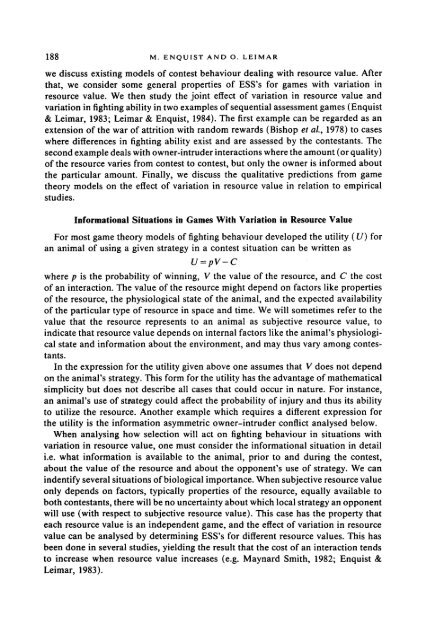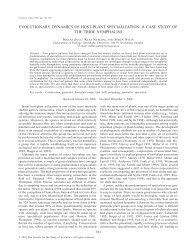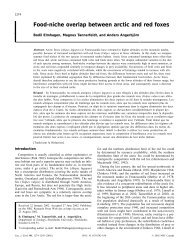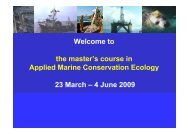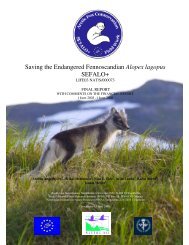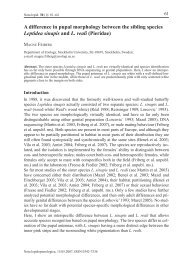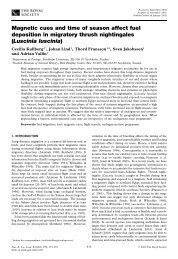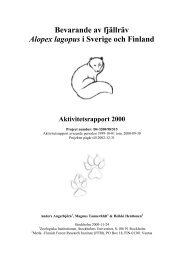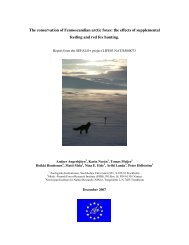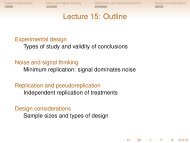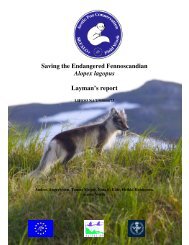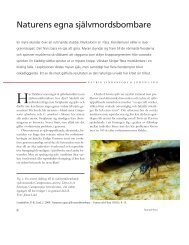Evolution of Fighting Behaviour: The Effect of Variation in Resource ...
Evolution of Fighting Behaviour: The Effect of Variation in Resource ...
Evolution of Fighting Behaviour: The Effect of Variation in Resource ...
You also want an ePaper? Increase the reach of your titles
YUMPU automatically turns print PDFs into web optimized ePapers that Google loves.
188 M. ENQUIST AND O. LEIMARwe discuss exist<strong>in</strong>g models <strong>of</strong> contest behaviour deal<strong>in</strong>g with resource value. Afterthat, we consider some general properties <strong>of</strong> ESS's for games with variation <strong>in</strong>resource value. We then study the jo<strong>in</strong>t effect <strong>of</strong> variation <strong>in</strong> resource value andvariation <strong>in</strong> fight<strong>in</strong>g ability <strong>in</strong> two examples <strong>of</strong> sequential assessment games (Enquist& Leimar, 1983; Leimar & Enquist, 1984). <strong>The</strong> first example can be regarded as anextension <strong>of</strong> the war <strong>of</strong> attrition with random rewards (Bishop et al., 1978) to caseswhere differences <strong>in</strong> fight<strong>in</strong>g ability exist and are assessed by the contestants. <strong>The</strong>second example deals with owner-<strong>in</strong>truder <strong>in</strong>teractions where the amount (or quality)<strong>of</strong> the resource varies from contest to contest, but only the owner is <strong>in</strong>formed aboutthe particular amount. F<strong>in</strong>ally, we discuss the qualitative predictions from gametheory models on the effect <strong>of</strong> variation <strong>in</strong> resource value <strong>in</strong> relation to empiricalstudies.Informational Situations <strong>in</strong> Games With <strong>Variation</strong> <strong>in</strong> <strong>Resource</strong> ValueFor most game theory models <strong>of</strong> fight<strong>in</strong>g behaviour developed the utility (U) foran animal <strong>of</strong> us<strong>in</strong>g a given strategy <strong>in</strong> a contest situation can be written asU=pV-Cwhere p is the probability <strong>of</strong> w<strong>in</strong>n<strong>in</strong>g, V the value <strong>of</strong> the resource, and C the cost<strong>of</strong> an <strong>in</strong>teraction. <strong>The</strong> value <strong>of</strong> the resource might depend on factors like properties<strong>of</strong> the resource, the physiological state <strong>of</strong> the animal, and the expected availability<strong>of</strong> the particular type <strong>of</strong> resource <strong>in</strong> space and time. We will sometimes refer to thevalue that the resource represents to an animal as subjective resource value, to<strong>in</strong>dicate that resource value depends on <strong>in</strong>ternal factors like the animal's physiologicalstate and <strong>in</strong>formation about the environment, and may thus vary among contestants.In the expression for the utility given above one assumes that V does not dependon the animal's strategy. This form for the utility has the advantage <strong>of</strong> mathematicalsimplicity but does not describe all cases that could occur <strong>in</strong> nature. For <strong>in</strong>stance,an animal's use <strong>of</strong> strategy could affect the probability <strong>of</strong> <strong>in</strong>jury and thus its abilityto utilize the resource. Another example which requires a different expression forthe utility is the <strong>in</strong>formation asymmetric owner-<strong>in</strong>truder conflict analysed below.When analys<strong>in</strong>g how selection will act on fight<strong>in</strong>g behaviour <strong>in</strong> situations withvariation <strong>in</strong> resource value, one must consider the <strong>in</strong>formational situation <strong>in</strong> detaili.e. what <strong>in</strong>formation is available to the animal, prior to and dur<strong>in</strong>g the contest,about the value <strong>of</strong> the resource and about the opponent's use <strong>of</strong> strategy. We can<strong>in</strong>dentify several situations <strong>of</strong> biological importance. When subjective resource valueonly depends on factors, typically properties <strong>of</strong> the resource, equally available toboth contestants, there will be no uncerta<strong>in</strong>ty about which local strategy an opponentwill use (with respect to subjective resource value). This case has the property thateach resource value is an <strong>in</strong>dependent game, and the effect <strong>of</strong> variation <strong>in</strong> resourcevalue can be analysed by determ<strong>in</strong><strong>in</strong>g ESS's for different resource values. This hasbeen done <strong>in</strong> several studies, yield<strong>in</strong>g the result that the cost <strong>of</strong> an <strong>in</strong>teraction tendsto <strong>in</strong>crease when resource value <strong>in</strong>creases (e.g. Maynard Smith, 1982; Enquist &Leimar, 1983).


